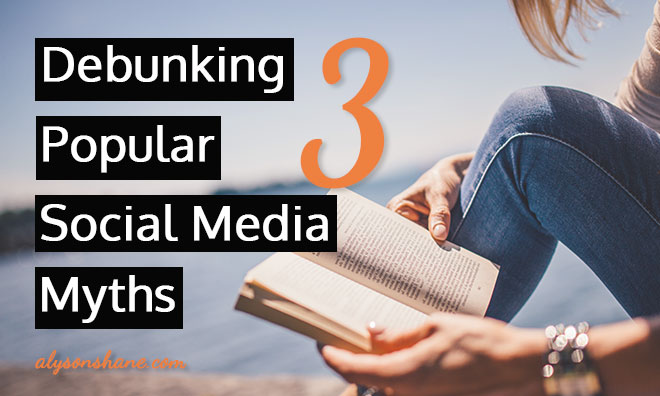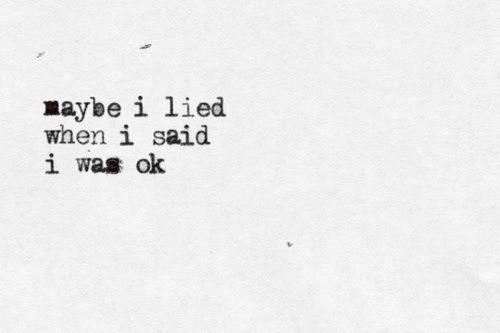October 2016
Debunking 3 Popular Social Media Myths
- by Alyson Shane
When it comes to social media, there's a wealth of information out there. A quick Google search for "social media tips" comes up with over 166,000,000 results. That's a lot of information!
Especially when you're first starting out, it may seem like there are so many "dos" and "don'ts" in terms of building an effective social media strategy, but while there are lots of great tips out there... I'm sorry to say that there are also a few myths which need to be debunked and removed from our collective memory.
What kinds of myths am I talking about? Let's take a look:

Myth 1: There's only one "right" time to post
This myth continues to exist because it's a well-intentioned one. Of course you want to post your content at times when your audience will be most likely to see it, right?
This is absolutely true, but what you need to keep in mind before you start pre-scheduling your content to go out every Tuesday at 4:45pm is this: do you know that that's when the majority of your target audience will be online?
This might be easy to figure out if your target audience happen to live in the same city as your business (if you're a local restaurant, for example) but if you're trying to reach a wider audience, and one which may even be in a different time zone than you are (say, if you're an international chain of restaurants) then you need to spend a little more time thinking about when they'll be online.
Myth 2: Your business needs to be on every social network
Often, one of the first things that a new client will ask me is: do I need to be on every social network?
The short answer, and the one I always give them is: no.
While it may seem like a good idea to get your name on as many social networks as possible, what you need to consider is the quality of the conversations and content that you can have on each network, not the quantity of them available for you to use.
it's also important to think about the kinds of people you want to reach, and where they spend most of their time online*. According to SmartInsights, 57% of Snapchat users are 16-24, whereas only 25% of the same demographic are regular Facebook users, and a paltry 29% are on G+.
So if your business is trying to target young people, Facebook and G+ may not be the best place to focus the majority of your marketing efforts.
Take the time to think about where your target audience are spending their time, and how your business can establish a presence on those social platforms. Otherwise, you'll just be wasting your time trying to connect with customers and clients who aren't interested in what you have to say or offer them.
Myth 3: You need to blog every day
Blogging is one of the most valuable tools at your businesses' disposal: it allows you to explain, in as much detail as you'd like, what your brand values are, what you offer your customers or clients, and your thoughts and insights in your industry, which can be helpful to your readers.
However, posting multiple times a day, or even multiple times a week, can actually damage your readership and reduce the flow of traffic to your blog.
Why does this happen? In a way, it's twofold: firstly, scarcity creates value. If your followers see that you're posting multiple blog posts every single day, then it's pretty likely that they will stop clicking through to read them because you're inundating them with information.
Secondly, people know that good content takes time to write, and if you're churning out blog posts faster than your readers can hit 'refresh', then it's pretty likely that the quality of the things you're saying isn't as high as it could be.
Instead of trying to post every day, aim for 2-3 posts a month of well-researched, well-documented content that will really help meet your readers' needs.
Did I miss any myths that need to be debunked? Tweet at me or tell me in the comments!
The Catharsis of Crying
- by Alyson Shane
How many times did you cry this week?
I cried 4 times.
- On Tuesday: I felt overwhelmed with my workload for the week (short weeks are hard.)
- On Wednesday: I was thinking about my Grandma, and was excited about seeing her this Christmas.
- On Thursday: In therapy (obviously.)
- Today: Watching this interview with Gord Downie and realizing how short my time with the person I love might be.
This used to be something that I was embarrassed about, but over the past few years I've come to accept that crying is just part of my existence. I used to fight it, and try to hold the tears back whenever they came, but these days I just let it out.
It's the best thing I've done for my mental health, if I'm being honest.
A Cryin' Shame(ing)
When I was growing up, my family members made fun of me for crying so much. I've always been moved to tears easily; the second something tugs at my heartstrings - good or bad - my eyes well up. My aunt once told me that she "worried that I was depressed" as a teenager because I cried at the drop of a hat.
In our household, crying was seen as a sign of weakness and something to be ashamed of. Allowing other people to see real manifestations of your feelings wasn't appropriate, and we were regularly warned against the dangers of sharing our thoughts and feelings with other people.
I remember, once, after a breakup in high school, I was crying in my room and my mother popped her head in to see what was wrong. I said "I'm so sad" and she replied by saying "I hope you don't act this way in front of your friends, or they'll start to get tired of hearing about it and stop being friends with you."
My family, which is of British descent, subscribes to the "suck it up" mentality: publicly displaying emotions of heartbreak, sorrow, or anything other than the status quo was always strongly discouraged, and my brothers and I were shamed and often belittled whenever we allowed our emotions to "get the better of us."
But in the last few months and years I've allowed myself to start getting over those fears. When I feel overwhelmed (which is often, running a business is a scary and often stressful undertaking) I just allow the few tears to come, and then wipe them on and move on with my day.

Anxiety and Crying
I have anxiety.
Anyone who has ever felt anxious knows that the plethora of negative emotions that come with it can often feel completely overwhelming, and for a long time I felt guilty because I used crying (secretly) as a coping mechanism. I cried in bathroom stalls and in my apartment when nobody else was home. When I was a kid I would go for long, extended walks through my neighbourhood because I didn't want my family to see or hear me crying.
For years, whenever I cried, or felt like I was going to cry, I would shame myself and feel guilty for not being able to prevent it.
I can't control my emotions.
I'm immature because I need to cry.
I'm not a good person because I cry easily.
However, in therapy (and with some supports from my friends and partner) I've come to realize that crying is just a part of life, and is a normal part of being in touch with my emotions. I used to feel guilty and get upset whenever I cried because I was trying to hide from my own thoughts and feelings, and I am so done with feeling guilty over crying.
Crying and Coming Together
The thing that's changed the most for me, and what led me to write this post, is that crying in front of other people has had the opposite effect from what my family told me it would: it's brought me closer to them.
John and I cry in front of each other regularly. Often, when we talk about our lives, our families, or our feelings for each other, one or both of us will start tearing up. Sometimes, when I talk to my friends about my anxiety, or things that are challenging me, I shed a few tears. And you know what? They don't hate me for it, and it doesn't make them want to be my friend any less.
In fact, knowing that I can be open with the people in my life in such a deeply personal way has been illuminating and life-changing. I can be myself; my sometimes-sad, anxious, messed-up self, and I can cry about it and be honest about it and it's the healthiest change that I've made in a long time.
Benefits of Crying
In fact, crying is actually good for you. Here are a few reasons why:
- Tears remove toxins. Tears actually remove toxins from our bodies. Tears help humans remove chemicals that build up during emotional stress.
- Crying relieves stress. Ongoing levels of stress can increase your risk of a heart attack and can damage your brain, and crying can help alleviate those stressful feelings.
- Crying lowers your blood pressure. Crying has been found to lower blood pressure and pulse rate immediately after a "big cry."
- It reduces manganese in the body. Crying reduces the body's manganese level. Manganese is a mineral which affects our moods, and is found in up to 30 times greater concentration in tears than in blood serum.
- Crying means you're human. All mammals' eyes are moistened and soothed by tears, but humans are the only mammals who express tears as a response to emotional stress or stimuli. Tears (and showing emotions) motivate us to empathize with each other, which encourages us to work together and survive.
So you know what? The next time you're feeling overwhelmed, or really happy... just cry it out. Hell, ugly cry if you must. There's no shame in it (as I'm slowly learning), and it's actually really good for you to cry it out sometimes.
Here's to a good cry!

